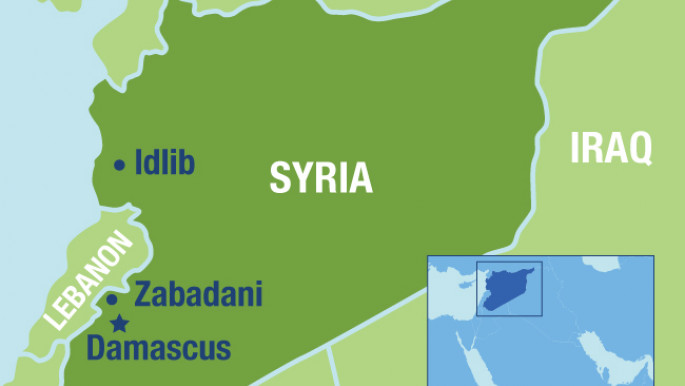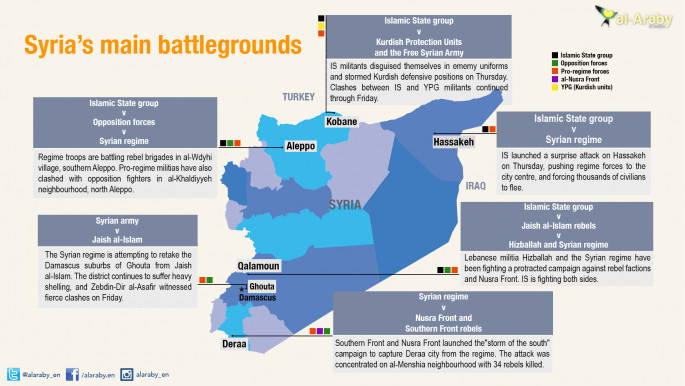Death from above, as Syria goes to hell
Syrian rebels have launched a new offensive on a strategically important air base held by Bashar al-Assad's forces.
Abu al-Dahur in Idlib province witnessed continued attacks on Monday from a battle-hardened rebel alliance, including Ahrar al-Sham and the Nusra Front.
Abu al-Dahur
The regime camp has been under attack before, and the rebels hope its capture will limit the number of air raids - which have wrought havoc among the civilians below and killed tens of thousands in territories held by opposition groups.
Rebel fighters broke through the wire perimeter of the airport on Monday, despite coming under sustained bombing by its defenders, the UK-based opposition Syrian Observatory for Human Rights reported.
Better coordination between rebel groups - with the support of Syria's formidable al-Qaeda franchise - has been critical in turning the tide against the regime in recent months.
It has helped the Jaish al-Fatah alliance wrest Idlib city and Jisr al-Shughour in March and April 2015 from government control, while other opposition brigades have seized territory in Latakia, Daraa and Hama.
Although the rebels are occupying more of the ground in Syria - and harrying the Syrian army's supply lines - the regime still controls the skies.
Damascus
Rebel-held Douma - a suburb of Damascus - has been under almost continuous aerial attack by regime war planes.
The indiscriminate bombing and shelling has left hundreds of civilians dead in a matter of weeks.
On 16 August, aircraft hit a market in the middle of the Damascus suburb. It killed as many as 120 people, mostly civilians.
This weekend 17 members of one family - the Issas - were killed when a bomb hit their home.
A civil defence team working in the suburb have described Douma as a "plagued city", in a statement issued to opposition newspapers.
The rescue workers have called on the United Nations, international NGOs, and the Arab League to save Douma's trapped inhabitants.
"The devastating attacks carried out against the city over the past few days has led to the deaths of more than 200 people, the injury of more than 400 others, and the destruction of a large number of buildings over the heads of their inhabitants," the statement read.
Besieged rebel-held eastern Ghouta, in the Damascus countryside, has also held-out after repeated government assaults.
This weekend the inhabitants remembered the two-year anniversary of the Ghouta gas attack, which killed as many as 1,700 civilians.
Their lives could have tipped the scales of the war - had the world taken a tougher stance, but now gas attacks on rebel-held civilian areas continue.
Today, the inhabitants of this scarred and skeletal urban landscape live under almost daily bombardment.
Idlib
 |
| [Click to enlarge] |
Rebel groups say they are trying to relieve pressure on blockaded Ghouta by launching a new offensive on regime areas in Idlib and Hama provinces.
Jaish al-Fatah and the Nusra Front have targeted two Shia-majority towns - al-Fouaa and Kafraya. Those living there have suffered from frequent shelling over the past week.
The Islamic Union of Ajnad al-Sham, meanwhile, threatened a daily bombardment of 100 shells upon the two towns, in a statement reported by the Syrian Observatory. This would be in retaliation for the attacks on Ghouta, it read.
Shelling and rocket fire on government-held areas is now becoming an increasingly frequent occurence, and is testing the patience of even dyed-in-the-wool regime supporters.
In July, even Bashar al-Assad was forced to confess - during a televised speech - that he no longer had the resources to police the whole country.
Some parts of Syria, he said, would have to be temporarily abandoned so soldiers could defend the government strongholds. He essentially asked for more "sacrifices for the greater good" from his supporters, although many believe they have already sacrificed too much.
It is estimated that half of Syria's once 300,000-strong army has been lost to the fighting or desertion.
Latakia
Damascus' new strategy of falling back from remote - often Sunni-majority areas - has allowed it to concentrate more of its troops on protecting its vital interests. This essentially means the capital Damascus and support base in Latakia - along with a thin line of built-up areas that runs between.
| It is estimated that half of Syria's once 300,000-strong army has been lost to the fighting or desertion |
However, even these areas are not safe from the rebels who have mounted another offensive on Assad's major support base. From the northern Latakian mountains they are looking at driving deep into the regime's heartlands.
Such movements have contributed in piling pressure onto Bashar al-Assad and sapping the morale of regime supporters. Assad is now looking less-and-less in control even of his home province.
Latakia city, still a relatively sleepy area compared with most of war-torn Syria, has come under shelling in the past week. It has led to the deaths of civilians and a Russian military officer, spreading fear in the process.
Kweres
However, the biggest downside to the regime's plan of "tactical withdrawal" is that whole divisions of the Syrian army are now seemingly abandoned by their government.
They remain almost completely cut off from supplies and reinforcements and are consigned to their fate, while IS fighters wait outside the perimeters of their bases.
This has happened before, in August 2014, when IS captured Taqba airbase in eastern Syria. The base had been encircled for months, but Damascus' refusal to send reinforcements had brutal consequences for the defenders.
When the airbase fell, 250 prisoners from the Syrian armed forces were executed. Macabre videos of their death were shared on social media by the group, which must have horrified their families and friends at home.
This must be on the minds of the government troops holed up in Kweres military airport.
It has been under sustained attack from IS fighters over the past two weeks. Dozens of officers have been killed in the IS assaults and shelling. Government soldiers responded to the bloodshed by beheading eight captured IS militants.
Damascus is coming under increased pressure from the families of the trapped soldiers to come to their aid. Tensions are rising in Latakia, Homs, and Tartous where mothers and fathers frantically await news about their sons.
Latakia has already seen unrest after an army colonel was murdered by a relative of Bashar al-Assad in a road rage attack that echoed the seemingly gangster-like mentality of many in the dynasty.
Many Alawites in the province feel they have sacrificed too many of their sons to support a mafia-like Assad state. But they know the alternative could be even worse.
More and more once ferociously loyal young Alawites are choosing to flee the country to avoid conscription in Syria's suicidal war.
Assad's control over the country looks weaker today than it has at any point during the war, but it would be premature to say it is coming to an end.
The bloody scenes witnessed in Douma and Ghouta in recent weeks show that Assad is still no closer to stepping down - and will go to any level to cling on to power. Ultimately, it means that more civilians will pay the price of greed and power.
 |





 Follow the Middle East's top stories in English at The New Arab on Google News
Follow the Middle East's top stories in English at The New Arab on Google News


